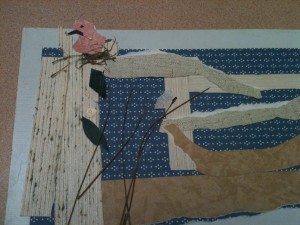problem-solving
Try the front row
The kids and I sat behind a family with three wiggly boys at Mass this morning. It didn’t take long for Michael, now a coach at Easter Seals, to notice that the youngest one was likely on the spectrum. I noticed, too, and remembered when my children could be that wiggly.
I thought for a moment about tapping the mom on the shoulder and offering her a tip, but then I remembered how I felt about advice from well-meaning strangers and kept my thoughts to myself.
Our church has Mass in the round. The altar is in the center of the room. It provides a good view for everyone, if you’re a grown-up. If you sit in the back, whether at St. Philip’s or at a church with a traditional layout, your kids seen only all the big people around you. But if you sit in the first row — and you have about six chances with a church in the round — all of the proceedings unfold right in front of you.
Mark had a bold idea when our church, St. Philip the Apostle in Lewisville, opened its new worship space in 1997. We wouldn’t sit in the back. We would sit right up front. If the kids wiggled, they would wiggle right onto the floor. And, they could see.
The first couple of times were a little scary. But it worked. The kids actually wiggled less because they could see what was going on. And, when they came back from children’s liturgy, they didn’t have to work too hard to remember where Mark and I were sitting because they only needed to scan the front rows.
I can’t remember when we realized the kids were calm enough that we could sit in other spots. But I do remember we started picking spots that would let Sam avoid the incense during the Gospel reading. He would slip out into the narthex and then slip back in at the end of the Homily, when it was done smoking so much. Eventually, we found a spot where the smell wasn’t as strong and we sat there so he could stay all the way through the service.
On the way home, as we shared our observations of the new Family Wiggly, I asked the kids if they could remember sitting in the front row and whether they liked it better. Could they see better? Did they know we did it so they wouldn’t wiggle so much? None of them could remember a bit of it.
Sam did remind us however, that while it may have been years since we’ve sat in a front row, we did for Mark’s funeral Mass.
Amen to that, Sam. Amen.
Overheard in the Wolfe House #236
Peggy: What’s on your mind there, Sam?
Sam (gazing to the ceiling): I don’t know. Trying to refresh it.
Overheard in the Wolfe House #234
Peggy: … so that would be the plan for worst case scenario.
Sam: Ok. (pauses) And, what makes it worst case scenario is that it usually doesn’t happen.
College for Kids
I’m wondering how many Denton old-timers remember that Texas Woman’s University used to offer “College for Kids,” a summer enrichment program for elementary school children.
All the Wolfe children went every summer for as long as they were eligible. Kids “aged out” in middle school. One of the organizers told me that was because middle school was about the age that kids would start finding ways to get into trouble.
As far as I can tell, the program ended rather unceremoniously in 2002. I don’t know if the people who ran it just ran out of steam or if the kids started “aging out” a little sooner.
Sam went as soon as he was old enough and he went every summer. The first summer we worked closely with the organizers to make sure Sam didn’t get lost going from building to building. After all, he was only a rising 4th grader! We took advantage of several quiet evenings on campus, the week before it started, to practice finding his classes. He did well, only getting lost once, on the first day, (there were four classes to find) and the staff helped him make it right.
The program helped Sam develop some independence and think about school in different ways. They had all kinds of fun classes in topics like rockets and printmaking and magic-making and video production.
Here’s what remains from the video production class. Paige rescued what she could from the copy we had that was getting magnetized.
Sam and Michael liked the magic class so much I’m pretty sure each of them took it more than once.
In one class, Sam learned to write music. I was surprised when he came home at the end of that session with this:
It was and is a sweet little tune.
When I unearthed recently, I put it up on the piano and tried harmonizing it very simply. I asked Sam, did I come close to what he imagined? He told me that’s the sort of thing that he thought musicians should be able to arrange and produce how they want.
I’ve often wondered how much guidance the teachers provided with such projects. Paige was 4 or 5 years old the last time we went to Bear Valley Music Festival. She and Michael participated in a summer art program at the little library that had them making collages with wallpaper samples and objects they found on nature walks.
Paige’s piece took my breath away, with the little bird in a nest perching above the boundaries of her collage. Did the teacher do that or Paige?
I’ll never know.
Ten things we didn’t know about autism one year ago …
Autism Speaks ran a super cool top ten list this week.
I’ve re-arranged their list by topic. I think it’s more useful that way, but you can refer back to their order, too. (ASD means Autism Spectrum Disorder. Let’s all get used to the change of language again.)
Prevention
Prenatal folic acid, taken in the weeks before and after a woman becomes pregnant, may reduce the risk of autism. Here’s the story.
Early intervention
High-quality early intervention for autism can do more than improve behaviors, it can improve brain function. Read more.
Being nonverbal at age 4 does NOT mean children with autism will never speak. Research shows that most will, in fact, learn to use words, and nearly half will learn to speak fluently. Read more.
Though autism tends to be life long, some children with ASD make so much progress that they no longer meet the diagnostic criteria for autism. High quality early-intervention may be key. Read more.
Researchers can detect presymptom markers of autism as early as 6 months – a discovery that may lead to earlier intervention to improve outcomes. Read more.
The first medicines for treating autism’s core symptoms are showing promise in early clinical trials. Read more.
Many younger siblings of children with ASD have developmental delays and symptoms that fall short of an autism diagnosis, but still warrant early intervention.Read more.
Social skills
Research confirms what parents have been saying about wandering and bolting by children with autism: It’s common, it’s scary, and it doesn’t result from careless parenting. Read more.
One of the best ways to promote social skills in grade-schoolers with autism is to teach their classmates how to befriend a person with developmental disabilities. Read more.
Other signs of hope
Investors and product developers will enthusiastically respond to a call to develop products and services to address the unmet needs of the autism community. Read more.
Autism, cooking and inference
Like most parents of a child with a disability, I’m on way too many email lists. Sometimes I get the itch to get off a bunch of them. After all, my child isn’t a child, he’s a grown man. The kinds of things we worry about, the world is just beginning to worry about. Many times I’m convinced the answer to our problem isn’t going to be in that mountain. Just like when he was little, when he was 1 in 15,000, and not 1 in 88, my job is to ready the pilgrimage and go find Mohammed.
But then something flies across cyberspace and there it is. A solution.
This time the reward for sifting through the mountain of email was finding out about Penny Gill, and how she teaches adults with autism how to cook.
When I was younger, combing through some of the recipes my mother used, I would sometimes get frustrated with the instructions. A lot was inferred, little was written.
Inference is a difficult skill to master for people with autism.
Julia Child came along and helped with instructions for how to cook, but she and all those television chefs expect us to generalize what they do. Generalizing is also a difficult skill for people with autism to master.
Can you imagine writing the recipe that really has ALL the steps? Well, Penny Gill and her team have been doing just that. Check out the directions how to make Bumbleberry Squares.
They have a cooking class coming up in the middle of the day, May 7 at Central Market in Dallas (scroll down to find the registration instructions). That’s a rotten time for us in the Wolfe family.
But we ordered the cookbook, Coach in the Kitchen.
Stay tuned.
Overheard in the Wolfe House #224
Peggy: You’re up.
Sam: Yes, I slept a lot because I have to work tonight and then again in the morning.
Peggy: I don’t know how you do it.
Sam: Sometimes I get to work in the morning and they say I’m not ready for work.
Peggy: Word.
Dave’s FCS and the village
My friend, Lyndsay Knecht, gave a shout out on Facebook the other day to the auto shop that our family has patronized since we moved to the Denton area in 1993 — Dave’s Foreign Car Service. She was happy that Dave recognized although her engine light was on, there wasn’t really anything wrong with her car. And he didn’t charge her for the look-see to make sure.
Sam thinks Dave’s is great, too. “They tell me what’s happening,” Sam says. He knows what work they’ve done to his car and what’s coming up — like changing brake pads and the transmission fluid — so he can plan.
“They also let me know when it’s time to get new tires,” Sam says.
He doesn’t get the tires at Dave’s. He goes a few blocks down to Briscoe to get that taken care of.
Because I know most everyone at Dave’s (I wrote about one occasion where Dave talked me off the ledge not long after Mark died), and I know they keep an eye on others who get their referrals, I don’t feel like I have to backtrack to make sure nobody’s taking advantage of Sam as he takes care of his car.
Sometimes, when I think about why Sam wants to stay in Denton (believe me, the marginal quality of life in the Barnett Shale makes you think really hard about that — and I didn’t say “terrible quality of life” because that would be an affront to the people of the Eagle Ford), I know it’s all these small, reliable relationships he has in the community.
The restauranteurs near Albertsons know him, especially the guys at Luigi’s Pizza, where he’s been known to knock back a pie all by himself on a break from work. He schedules his own check-ups at the dentist and the doctor. Wayne Johnson takes good care of his diminishing hair line at Unique Barber Stylists. They know him DATCU credit union, too. And of course, there’s everyone at Born2Be.
Even for adults, it takes a village.
What I did on my spring vacation
I’ve been home from work for the past week, burning off vacation time that I would have otherwise lost. I didn’t make any plans, other than to visit Mark’s Aunt Regina in East Texas. I was able to stop by Born2Be Wednesday and watch Sam prepare for regional Special Olympics.
Here he is working on part of his trail pattern
Sam and I took Regina out to lunch and then we took her on a drive to, and through, Mrs. Lee’s Garden.
Regina told us that, back in the garden’s heyday, there were many more daffodils than we saw on Friday. I can’t imagine. The Dallas Arboretum should have so many blooms.
Sam and I took turns taking photos of each other sitting on a rock in the sun. It was a beautiful day.
Then we went back to Regina’s house and helped her change a handful of lightbulbs, something we do for her in about three out of every four visits. Sam put a CFL in one slot, and that bulb just keeps on shining. But we can’t talk her out of the incandescents in the other spots. I forget how frequently those burn out.
This week at home, I raised puttering to competitive sport. Well, maybe not puttering as much as spending time at the bottom of the to-do list, taking care of those things that always seem to languish. The loppers got fixed, for example, as did the hose to the shop vac. Then a whole bunch of stuff got lopped or vacuumed.
Inside the house, I went through my annual ritual of cleaning out files to make room for other paper. I figure if I don’t buy more filing cabinets, then I can keep the paper collection down. It’s hard. I see so many things as source material, holding the potential to be the start of another great story.
While tending the garden, I got plenty of thinking time in. Then turned that into more personal writing time. That always feels good.
About ten years ago, I read a magazine story about how to keep the spirit of a vacation going after returning to the daily grind. It really improved our family’s quality of life to find lazy time together, occasionally staying up late to watch a movie or make an otherwise ordinary meal a grand occasion. A week at home packs its own wisdom for the rest of your days. I think I finally caught on.
Autism and wandering
Autism parents are strong, but there are so few resources.



